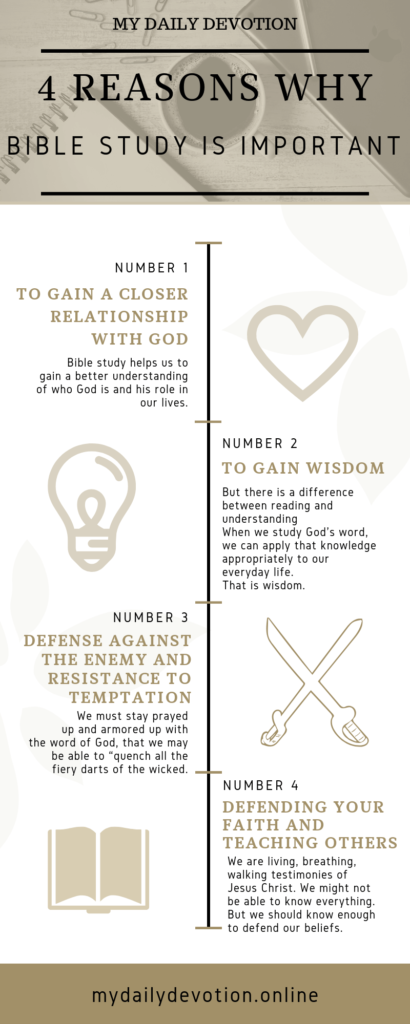
We need to study the Bible to discover what God has to say to us and to know what He requires of us in our lives. The Bible contains the instructions and teachings of God, which are essential for our faith. Considering the importance of Bible study, we can build our faith and become strong in our convictions. Here are a few reasons why we should study the Bible:
Paying attention to context
The first principle of biblical exegesis is to read each Bible passage in its context. When you read a Bible verse out of context, you are more likely to misunderstand its message. To understand a Bible verse, consider four principles: literal meaning (what it actually says), historical setting (when it was written), grammar, and synthesis, which is comparing a passage to other Scriptures.
As you read the Bible, keep your eye out for key words and phrases. Some words will be repeated or puzzling, while others may be unclear or even theologically important. When you see a key word, take a moment to ask yourself, “What does that mean?” and mark the passage with a distinctive marking system. A Bible study tool can help you identify key words in Greek and Hebrew, as well as provide context.
Historical books
There are eight “historical books” in the Bible. But this term is misleading. While these books seem to relate the history of the Israelites, their primary purpose is to establish an understanding of God’s covenant with the tribes. Biblical books can be divided into two categories: the historical and the prophetic. Often the historical books are not based on the accounts of actual events, but they do tell a story about people who lived in that time period.
The biblical narratives deal with different constitutional issues in Israelite polity. Each section deals with one of the most important constitutional issues of the Israelite nation. This storytelling style makes historical books in the Bible remarkably similar to the American “western.”
Poetical books
Sapiential books, or Poetic Books, are the five or seven books of the Old Testament considered to be most representative of the Wisdom tradition. Not all Psalms are considered part of this tradition. While all of these books contain the same type of wisdom, only a few are classified as Sapiential. Below we will look at some of the books of the Sapiential tradition. Listed below are a few of the most popular works of the Sapiential tradition.
The Old Testament contains numerous poetical passages, with some containing almost all of the content. While the OT contains many poetry books, most prophetic and wisdom books are also poetic. While the number of poetic passages in the NT is less than in the OT, poetry is still a large part of the Bible’s narrative. The gospels, Acts, and some epistles contain poems. Using meter and rhyme, poets can distinguish between prose and poetry.
Prophetic books
The Prophetic Books of the Bible are a special kind of literature that is considered by Christians to be of great importance. They are the books of the Old Testament written by prophets, with the books of the major prophets being longer and more influential than the minor prophets. The prophetic books provide information about the upcoming restoration of Israel and the surrounding nations. These books also point to the coming Messiah, as they contain warnings about the impending judgment of God on the world.
The prophets often refer to past events and stories from the Torah to inspire their audience to turn away from the path they are on. In this way, they are able to remind the audience of a special pact they have made with God. If they remain loyal, they will receive the blessings of God and will be protected by his people. If they turn away from God, however, they will be cast out of their land.
Infusing your life with God’s wisdom
Infusing your life with God’s wise words is essential for the good living of every human being. The Bible contains essential knowledge for God’s children. God has revealed all truth in His written Word – the Bible – and through His creation. However, if we want wisdom, we must ask God for it and listen to His voice. Studying God’s word will provide us with wisdom and knowledge, so that we can live a life of peace and joy.
The wisdom that comes from God is more reliable than human wisdom. Human wisdom is weak, elementary, and impotent. God’s wisdom is pure, filled with strength, and transcends human understanding. The Bible’s wisdom is more valuable than gold, but you must learn it. Only then will you be able to trust it and apply it to your life. It’s the most effective way to transform your life and live it according to God’s will.
Biblical examples of people living according to God’s will
While the Bible is filled with many specific examples of people living according to God’s plan, not all decisions are covered. Sometimes you might wish that God would write his will on the wall or speak to you through an audible voice. Ultimately, however, God would rather have you seek his guidance in spite of circumstances. During your quest for guidance, remember that Jesus said to seek the kingdom of God first, and then all else.
Jesus’ example demonstrates the benefits of giving to the poor and helping others. The woman in Bethany came to Jesus with an alabaster jar of expensive perfume. When Jesus was reclining at the table, she poured the perfume on his head. It was her way of saying “thank you, Lord.”
